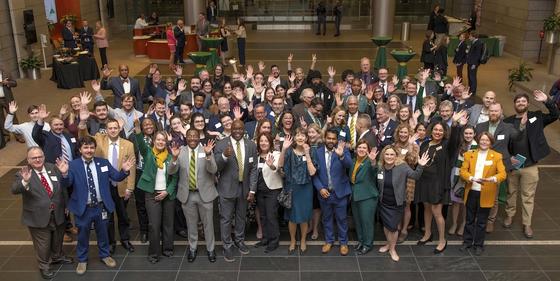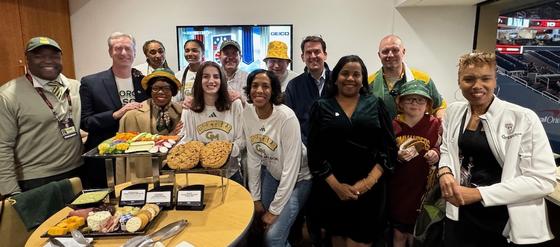The state budget, signed by Gov. Glenn Youngkin on May 2, represents the Commonwealth of Virginia’s continued investment in George Mason University as the state’s leading university for access, innovation and upward mobility. The funding goes into effect July 1, 2025.
Support for Students
The university received $7,432,000 to maintain affordability and $1,984,000 in financial aid assistance. On May 1, George Mason’s Board of Visitors (BOV) voted to keep tuition costs flat for in-state students, in recognition of the university’s commitment to being an affordable option for students and families across the commonwealth. At the same meeting, the BOV approved a tuition increase for out-of-state students as well as an increase in mandatory student fees for all students.
The budget also includes an additional $3 million in operating support.
“[Senate] Chairwoman Louise Lucas, [House] Chairman Luke Torian, and the committee membership have many demands on their time and resources, and we work to ensure they see the return on investment coming from George Mason back to the commonwealth,” said Lauren Posey.
Senators Barbara Favola, Dave Marsden, Jeremy McPike, Stella Pekarsky, Todd Pillion, and Bryce Reeves and Delegates David Bulova, Paul Krizek, David Reid, and Briana Sewell were instrumental as George Mason budget patrons this session, said Posey, director of state government relations for the university.
Support for Veterans

The FY26 budget includes reoccurring funding for the Virginia Military Survivors and Dependents Education Program. With more than 4,700 students identifying as active-duty service members, veterans, or dependents, George Mason is a vital resource for Virginia’s largest military-connected community. The university earned the top spot in Virginia and nationally among public universities for its MBA program for veterans from U.S. News & World Report, and was ranked first in Virginia and the Washington, D.C., metropolitan region for its master’s in nursing for veterans. In September 2024, U.S. News & World Report ranked George Mason as one of the state’s best colleges for veterans, and the university is continually recognized as a Military Friendly institution, earning a silver ranking for 2025-26.
Driving Virginia Business Development
The budget also included $700,000 in dedicated investment to sustain Virginia’s Small Business Development Centers (SBDCs)—a network of 25 centers that has served more than 11,000 clients, providing no-cost counseling and training services to local entrepreneurs across the state. The centers are operated through a cooperative agreement with Mason Enterprise. SBDCs are a key part of the Mason Virginia Promise, which provides a pathway to a four-year degree for any Virginian who wants one, or help starting a business.
Faculty and Staff Compensation

State employees employed on or before February 25 will receive a 1.5% one-time bonus under the new budget, to be paid on June 16. Classified staff hired on or before March 10, 2025, who received a performance rating of “contributor” or higher will receive a 3% across-the-board base salary increase. Instructional/research and administrative faculty will receive a 1.5% increase plus possible additional increases based on market, performance, or other considerations. Raises will be effective June 10 for July 1 paychecks for 12-month faculty and classified staff paid semi-monthly, and in September 16 paychecks for 9-month faculty.
With the budget approved, the state government relations team is preparing for George Mason’s six-year plan with state agencies, coordinating tours and events with state legislators, and looking ahead to this year’s state elections in November.
Government Relations Team at Work
“We appreciate the commonwealth’s continued support. This historic investment into George Mason allows us to deliver a high-quality education while providing an excellent value,” said Posey.
The government relations team, led by Vice President for Government and Community Relations Paul Liberty, works throughout the year to develop relationships with national and state leaders, including Congress and the General Assembly.
Liberty, Posey, and Tyler Javonillo, assistant director of state government relations, collaborate with university administrators to prepare for meetings with state leaders. During the session, George Mason President Gregory Washington briefed the Northern Virginia delegation and met with a variety of legislators to discuss the university’s economic and workforce development impact, leadership in technology and public health, student success outcomes, and other topics.
“We like to showcase every aspect of Mason—our students’ academic achievements, impactful research, community resources, economic impact and many other points of interest—to legislators,” Posey said, so that they get a full understanding of George Mason’s impact and reach.
